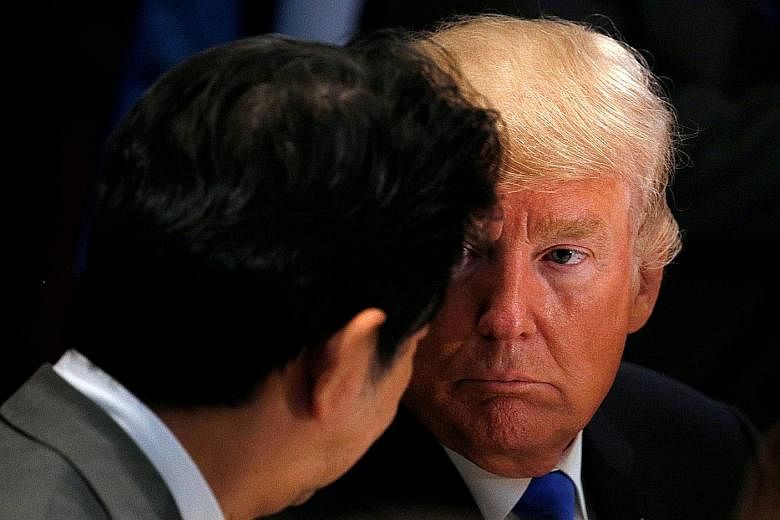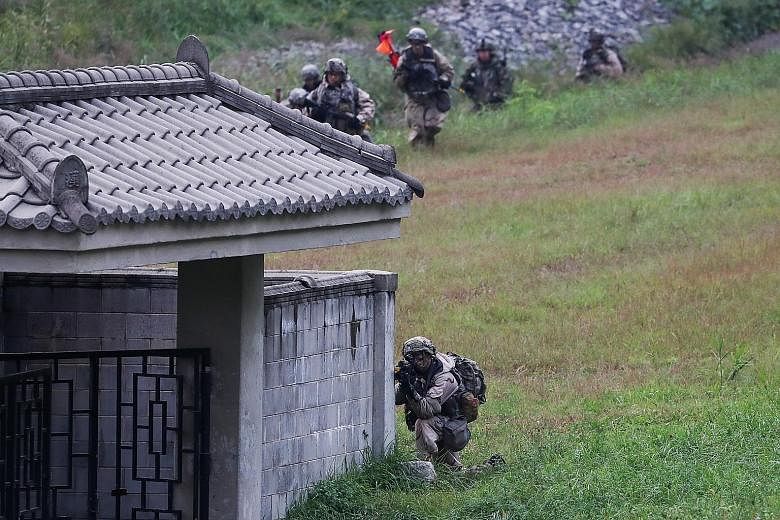With his threat to "totally destroy North Korea", Mr Donald Trump has stoked fresh jitters in Asia.
"The United States has great strength and patience, but if it is forced to defend itself or its allies, we will have no choice but to totally destroy North Korea," the US President said in his first speech to the United Nations General Assembly.
US allies Japan and South Korea, while blindsided by its vehemence, have sought to cast a positive spin on the speech. China and Russia, meanwhile, have again urged restraint and a return to dialogue.
Pyongyang, wont to meet threats by the US with fiery rhetoric, had not responded as of last night.
Yesterday, Japanese Prime Minister Shinzo Abe said the global community needed to unite to enforce sanctions and apply pressure on North Korea to stop its nuclear and missile programmes. "Now is not the time for dialogue. Now is the time to apply pressure," he told a gathering of investors at the New York Stock Exchange.
He and Mr Trump, along with South Korean President Moon Jae In, will meet for trilateral talks today (tomorrow, Singapore time).
The North Korean threat has provided Mr Abe with fresh impetus to revise the pacifist Constitution, as a means of bolstering the nation's ability to deter Pyongyang. This will likely be laid out in his ruling Liberal Democratic Party's campaign manifesto in a snap Lower House vote expected next month.
Mr Trump's previous comments - that the US was "locked and loaded" to rain "fire and fury like the world has never seen" on North Korea - were privately met with disquiet among officials in Tokyo and Seoul.
Amid concerns that the latest remarks could well lead North Korean leader Kim Jong Un to retaliate, Tokyo and Seoul publicly stressed what they saw as positives.
Japanese Chief Cabinet Secretary Yoshihide Suga said Tokyo "highly appreciates" Mr Trump's call for the denuclearisation of North Korea and for the global community - including China and Russia - to cooperate to apply more pressure on the North. Much domestic attention was also paid to Mr Trump's addressing of a longstanding issue - Pyongyang's abduction of Japanese nationals in the 1970s and 1980s, noted research fellow Ippeita Nishida of Tokyo think-tank Sasakawa Peace Foundation.
In Seoul, presidential spokesman Park Soo Hyun said Mr Trump has shown a "firm and specific stance" against the North, and highlighted the urgency for maximum sanctions and pressure.
China and Russia were less effusive. Reiterating Beijing's call for diplomacy, China's Foreign Ministry spokesman Lu Kang said: "All parties should take more proper actions that can help de-escalate tensions."
An editorial in the China Daily newspaper said Mr Trump's speech was "full of sound and fury". It said: "Today's dangerous deadlock has been the result of Pyongyang's and Washington's persistent pursuit of their own interests in disregard of other countries' efforts to persuade the two antagonists to talk."
In Russia, Mr Andrei Klimov, who chairs the foreign affairs committee in the Upper House of Parliament, said: "Any military conflict means civilian deaths. It is especially odd as the US considers South Korea and Japan its allies, and they could be affected in case of a strike."
Experts said Mr Trump's gambit could well backfire. Dr Choi Kang, vice-president of research at Seoul think-tank Asan Institute for Policy Studies, said it could be seen as a "targeted message" to China and Russia, to do more to impose sanctions on the North. "But in North Korea's perspective, they will say this is an act of war," he added.
Professor Shi Yinhong, an international relations expert at Beijing's Renmin University, said: "Mr Trump is still using the old and ineffective way of threatening North Korea and indirectly pressuring China." This, however, would make the North Korean leader "even more bent" on developing the nuclear and ballistic missile programme that he views as critical to his country's survival, he added.
"China is very worried about Mr Kim and it is also very worried about Mr Trump. But there's nothing very much it can do."
•Additional reporting by Chang May Choon in Seoul and Chong Koh Ping in Beijing


